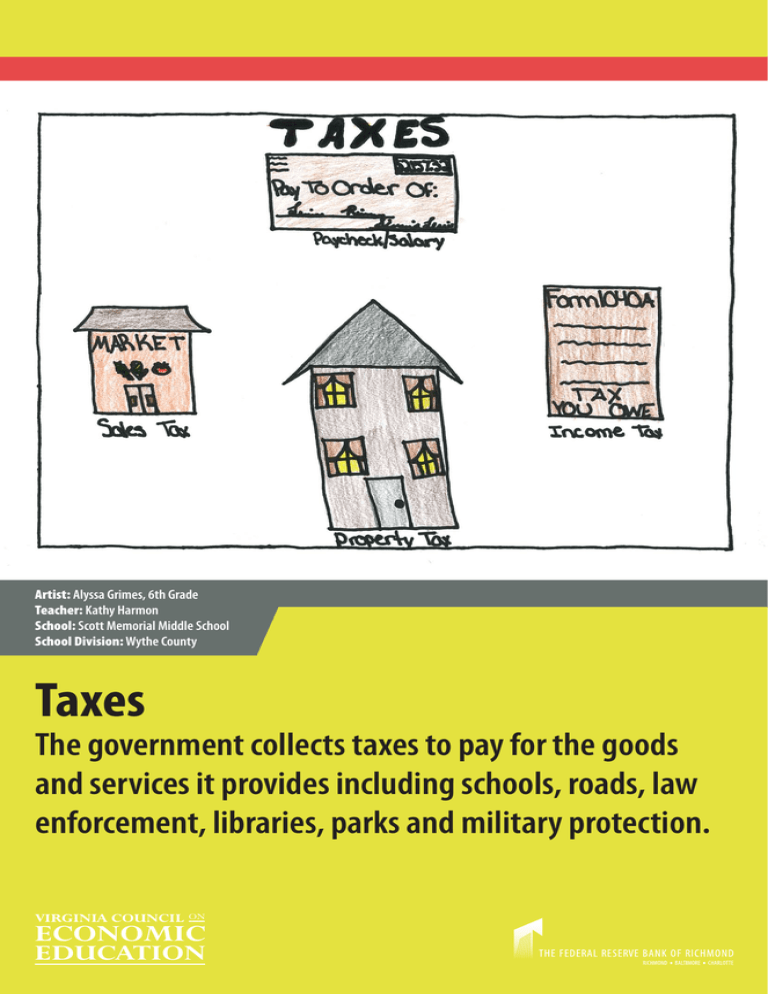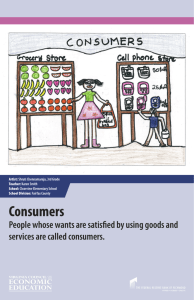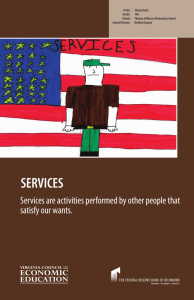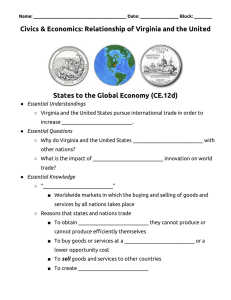The government collects taxes to pay for the goods and services it
advertisement

Artist: Alyssa Grimes, 6th Grade Teacher: Kathy Harmon School: Scott Memorial Middle School School Division: Wythe County Taxes The government collects taxes to pay for the goods and services it provides including schools, roads, law enforcement, libraries, parks and military protection. TAXES Definition/Background By definition, taxes shift resources from the private sector (households and businesses) to the public sector. The purpose of the shift is to pay for the goods, services, and government operations that we, through our elected representatives, ask government to provide. There are many different types of taxes; the major ones include sales, income and personal property taxes. Most federal government tax revenue comes from personal income and payroll taxes. Payments to Social Security recipients, the costs of national defense, medical expenditures and interest payments on the national debt constitute the bulk of federal government spending. Most state and local government revenues come from sales taxes, grants from the federal government, personal income taxes, and property taxes. The bulk of state and local government revenue is spent for education, public welfare, road construction and repair and public safety. Nobody likes to pay taxes, but we all enjoy our roads, parks, and public libraries. Understanding the role of citizens as taxpayers and the role of government in providing goods and services to the public can help prepare students to be fully engaged citizens. Teaching Ideas 1.Work with students to generate a list of goods and services provided by the government. This list might include governance, policing, courts and prisons, national defense, education, healthcare, water, roads and sewers. The list may then be divided into goods and services. Next, generate a list of taxes paid by citizens to local, state, and federal governments. This list might include sales, hotel, and income taxes. Help students to understand that the taxes paid by citizens (from the second list) allow the government to meet some of the citizens’ wants (on the first list). 2.Taxes are as old as human civilizations. Ask students to research taxes in Ancient Egypt, Ancient Greece, Ancient Rome, Mali and Europe in the Middle Ages. Who paid the tax, how was it collected, and how did the government use the revenue raised? 3.Guide students in an investigation of the origins of the income tax—the 16th Amendment to the U.S. Constitution ratified in 1913. Why was the tax created? Lessons and Resources Print Lessons Financial Fitness for Life: Steps to Financial Fitness Grades 3-5. Lesson 3: People Pay Taxes Focus: Economics in Civics and Government. Lesson 11: How Should Governments Structure the Tax System? Also online at http://www.nceestore.com/lessons/Focus_Civics_Lesson_11.pdf (middle) Focus: Middle School Economics. Lesson 10: Where Does the Money Go? VCEE is a nonprofit organization providing Virginia’s K-12 teachers with professional development, quality curriculum and other resources to promote economic and financial education. Visit www.vcee.org or contact VCEE or one of its affiliated centers for economic education to learn about specific opportunities. VCEE Network Contacts VCEE Sarah Hopkins Finley (804) 827-1211 shfinley@vcu.edu Old Dominion University Ruth Cookson (757) 683-5570 rcookson@odu.edu Christopher Newport University Gemma Kotula (757) 594-7404 econedu@cnu.edu Radford University Ermie W. Wade (540) 831-5890 ewwade@radford.edu George Mason University Rachel Powell (703) 314-0226 gmupowell@yahoo.com University of Virginia’s College at Wise Gary Stratton (276) 328-0223 grs6j@uvawise.edu James Madison University Lynne F. Stover (540) 568-3248 stoverlf@jmu.edu Virginia Commonwealth University Suzanne Gallagher (804) 828-1628 sgallagh@vcu.edu Lynchburg College Cheryl Ayers (434) 544-8791 ayers.c@lynchburg.edu Virginia Tech Barbara Taylor (540) 231-1147 bjtaylor@vt.edu Online Lessons Cowboy Bob Builds a Community (elementary) http://www.econedlink.org/lessons/index.php?lesson=EM665&page=teacher A Taxing Situation (upper elementary) http://www.powellcenter.org/uploads/ATaxingSituation.pdf Who, Me? Pay Taxes? (middle) http://www.powellcenter.org/uploads/WhoMeU.pdf An Economic Snapshot (middle & high) (effect of economic downturn on tax revenue) http://www. econedreviews.org/lesson.php?id=1169 Where Does the Money Come From? (middle) http://www.econedlink.org/lessons/index. php?lesson=69&page=teacher Fed Resources Income Taxes: Who Pays and How Much? http://www.stlouisfed.org/education_resources/assets/lesson_plans/06ITV_IncomeTaxes.pdf Literature • T axes, Taxes! Where the Money Goes by Nancy Jean Loewen. Picture Window Books, 2005. This book introduces students to taxes and discusses some of the things that are funded by them such as education, transportation, and national defense. [Grades 4-8] • Tricking the Tallyman by Jacqueline Davies. Random House Children’s Books, 2009. In 1790 the citizens of Tunbridge need to make a choice. What should they tell the census taker about the population of their town? [Grades K-8] • Colonial Voices: Hear Them Speak by Kay Winters. Dutton Juvenile, 2008. In 1773 young Nathan delivers news about the tea tax to Boston’s merchants. [Grades 4-8] The Virginia Council on Economic Education, in cooperation with The Federal Reserve Bank of Richmond, is pleased to provide this poster featuring a winning entry from the 2009-2010 Color the Economic Concepts Contest. Teachers in Grades K-8: Give your students the opportunity to illustrate their knowledge of economic concepts in a creative and fun way. They may be selected for a poster next year! Winning students also receive a $50 U.S. Savings Bond. Entries must be received by April 29, 2011. See www.vcee.org for more details. For more resources on teaching economics and the Federal Reserve System go to www.richmondfed.org/educational_info. You’ll find free and easy to use resources such as lesson plans, workshop information and publications. Lis Turner Economic Education Specialist Lis.Turner@rich.frb.org (800)526-2031 (804)697-8135


